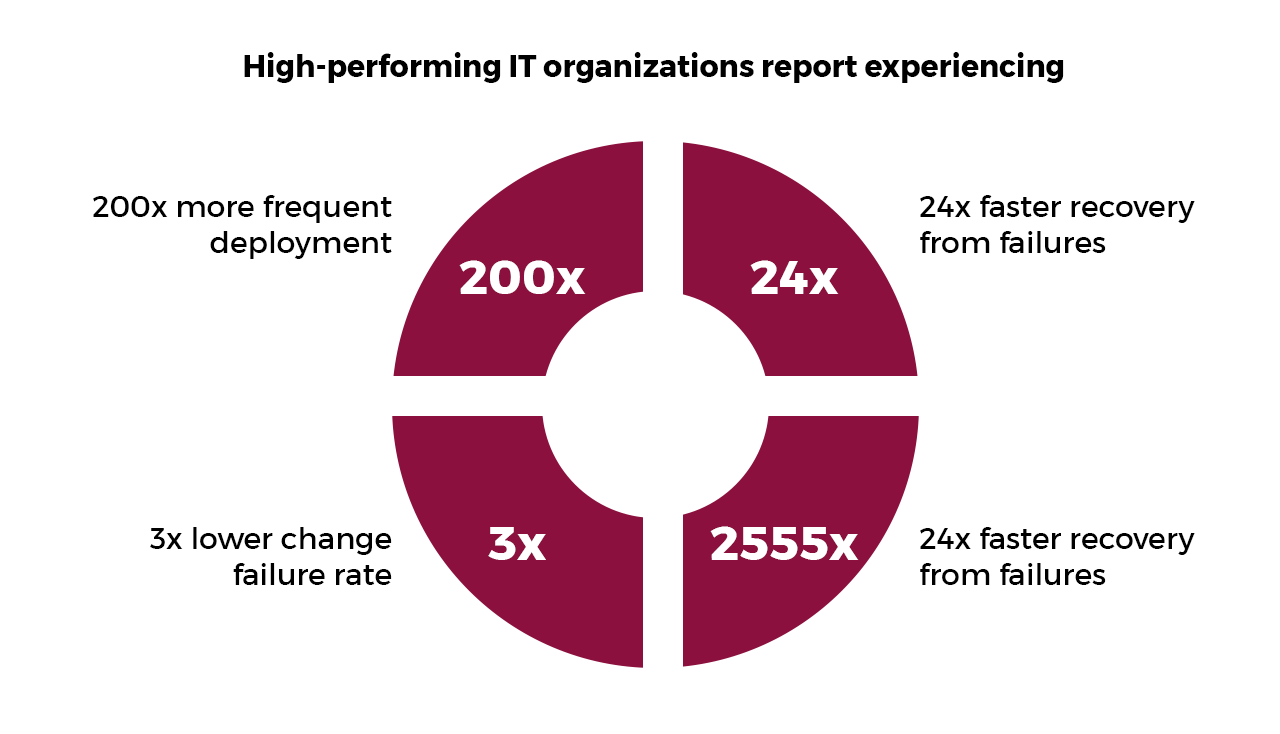We all know if you want to succeed in today’s business world, you need two key things. One, Business Stability & Second, Adaptability. DevOps (Development & Operations) is not a job title or role. This is a software development approach which combines development and operations to enable an agility which dims the differences between software development and operations.
Many companies consider DevOps as a challenge, rather than seeing it as an opportunity. An opportunity which can take your software development process to a new level. 67% of the SMEs & 47% of larger enterprises have adopted DevOps in their software engineering services. DevOps implementation is not easy. It has faced extensive challenges which need to be resolved before DevOps becomes the permanent work culture.
DevOps is not a Goal, But a Never Ending Process of Continual Improvement
-Jez Humble
Change is always difficult. Both for a business and also for an employee. But, facing those tough challenges and succeeding with innovation is what makes a difference. In this blog, we are going to discuss some difficult DevOps implementation challenges companies are facing & how to come out from those challenges.
Development v/s Operations
The entire concept of DevOps based on a collaborative effort from different teams to produce quick results. But, various individuals failed to understand this concept. Developers usually play with codes in order to build an innovative product. During the course of a development cycle, sometimes they do experiments to identify the best possible path. They even make changes in a quick succession. At the same time, operations team always try to achieve the highest level of quality in terms of product features and functionalities.

They always assume developers deploy untested code in production, which produce a sloppy product. This is what creates difficulties. Two teams, who supposed to work together, work on different mind-set and objectives. At the end, it creates project delays, more complexities, and lesser scope of innovation. The first challenge a company will face is to blend different people, teams together to work on a single goal.
Cultural Changes
Workplace culture is something which witnesses the maximum amount of changes during the phase of DevOps implementations. As DevOps is itself a culture, during the time of implementation, it collides with the existing work culture. As we told before, changes are tough. It takes a lot of time for employees to adopt a new culture and make themselves fit into that. Cultural change is not a short-term process. So, as a business owner, you need to fix this before implementing DevOps completely in your software development process. You can start with small DevOps training programmes and make your team believe in the concept. It is always a wise option to build a team of pro-DevOps who can work as influencers within the organization.
Tools
You can access numerous open source tools while implementing DevOps. One can feel, most of these tools are here to solve any kind of complex business challenges. During the course of development, companies allow their employees to use all these tools. But the real challenge comes when you don’t know how to use those tools. Lack of training is the main issue here. Data security will come next followed by infrastructure integration. Before addressing these challenges, you need to address your employees first. If you won’t provide tool training, be ready for more project complications, delivery delays and sloppy products. Either give training or let your team choose those tools on which they can work confidently.
Legacy Systems
Legacy systems are roadblocks. DevOps is a new concept and it runs on agility. Old legacy systems won’t help you in getting expected DevOps results. Some of those legacy systems can’t even integrate. As a result, the entire IT infrastructure will become less effective and slow. In order to overcome this challenge, you need to update with the latest technology. There are many companies who try to install new technology to work with older systems. This will make your entire IT system unproductive. You must consider legacy system and application changes at the time of DevOps implementation.
Process Changes
If your company is following a specific guideline or framework for software development, DevOps might be a tough task for you. Please remember, DevOps doesn’t have any central team or fixed framework. You won’t even get predefined KPIs which will help you.Challenge comes when different teams with different skill sets, work ethic and approach work together. There are high chances of conflict. Let your team choose their framework and project actions. This will reduce the chances of confusion and will empower your DevOps team.
Resistance to Change
We all work in our comfort zones and any change in that can make us less productive or it can also affect someone psychologically. There are people who won’t be comfortable working with a different team. Collaboration is not that easy at times. As a result, this can raise a voice of distress within the organization. In past when have seen there is a misconception among employees that DevOps will take many jobs in future. But, DevOps is a methodology, which requires human efforts and implementation.

In order to come out of challenges regarding resistance to change, you can implement DevOps in a small portion of a project. Let your employees get comfortable with the change gradually. But, if you are a laggard and want to keep yourself away from such challenging situations, you can become a technically substandard company and it will affect your business process.
Organizational Vision
This is a common challenge various companies face. There is a central DevOps team and they work as a single team with a single supervisor. So, if any issues arise, you need to address it as a whole. But, most of the managers address issues differently. E.g. they will resolve development & operations issues separately. This will result in DevOps failure. You need to discuss issues collectively and resolve them together.
Conclusion
DevOps is an evolving IT culture. The results of DevOps implementation have seen enormous growth in the past couple of years. Companies are working hard to overcome these challenges to progress their focus on DevOps implementation. DevOps offers a steady platform to deploy software. Companies can take more risks in order to develop something innovative. This will enable quick deployment cycles with powerful features. The goal of DevOps lies on employee empowerment, test driven development, easy monitoring, process automation, and innovation. At the end, DevOps will optimize your software engineering services.
Apogaeis is a DevOps and Automation specialist company allowing large enterprises to disrupt traditional software delivery models of Web App Development, Mobile App Development and Customized Software Development with accelerated speed, higher quality and optimized cost using new technology. Contact today to understand more on how DevOps works and how it can transform your business. For FREE CONSULTATION contact here.










Thanks for Sharing this great article..Its really nice and useful for us… keep sharing..
Pursuing advancement can be uncomfortable because it calls for teams to move out of their comfort zones. Progress comes with challenges at first, but pays off when you stay the course.
The challenges of DevOps are clearly mentioned. I got a clear idea about DevOps and its goal. Thank you.
Hi, Thanks for sharing nice articles about DevOps